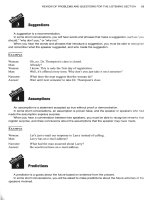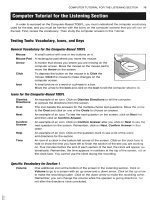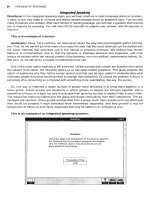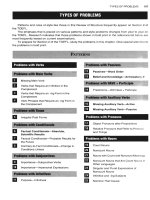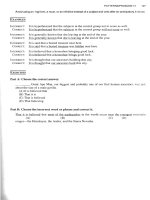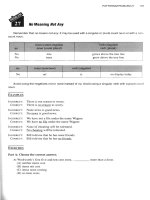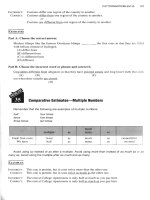Tài liệu How to prepare for the toefl part 14 pdf
Bạn đang xem bản rút gọn của tài liệu. Xem và tải ngay bản đầy đủ của tài liệu tại đây (417.5 KB, 10 trang )
Avoid using an -ingform, a noun,
or
an infinitive instead
of
a
subject and verb after an anticipatory itclause.
INCORRECT: It is hypothesized that the subjects in the control group not to score as well.
CORRECT: It is hypothesized that the subjects in the control group will not score as well.
INCORRECT:
It is generally known that she leaving at the end of the year.
CORRECT: It is generally known that she
is
at the end of the year.
INCORRECT:
It is said that a buried treasure near here.
CORRECT: It is said that a buried treasure was hidden near here.
INCORRECT:
It is believed that a horseshoe bringing good luck.
CORRECT: It is believed that a horseshoe brings good luck.
INCORRECT:
It is thought that our ancestors building this city.
CORRECT:
It
is thought that our ancestors built this city.
Part
A:
Choose the correct answer.
Giant Ape Man, our biggest and probably one of our first human ancestors,
was
just
about the size of a male gorilla.
(A) It is believed that
(B)
That it is
(C) That is believed
(D)
That believing
Part
B:
Choose the incorrect word
or
phrase and correct
it.
That it
is
believed that most of the earthquakes in the world occur
near
the youneest mountain
(A)
(B)
(C)
(Dl
ranges-the Himalayas, the Andes, and the Sierra Nevadas.
128
REVIEW
OF
STRUCTURE
ROBLEMS
WITH
Have, has,
or
had
+
participle express duration of time.
4
Predictions-
Will
Have
+
Participle
Remember that
will
have
followed
by
a participle and a future adverb expresses a prediction for a
future activity or event.
Avoid using
will
instead of
will
have.
INCORRECT: YOU will finished your homework by the time the movie starts.
CORRECT: YOU will have finished your homework by the time the movie starts.
INCORRECT: Jan will left by five o'clock.
CORRECT:
Jan will have left by five o'clock.
INCORRECT: Before school is out, I have returned all of my library books.
CORRECT: Before school is out, I will have returned all of my library books.
INCORRECT:
We have gotten an answer to our letter by the time we have to make
a
decision.
CORRECT:
We will have gotten an answer to our letter by the time we have to make a decision.
INCORRECT: Before we can tell them about the discount, they will bought the tickets.
CORRECT:
Before we can tell them about the discount, they will have bought the tickets.
Part
A:
Choose the correct answer.
By the middle of the twenty-first century, the computer a necessity in every home.
(A) became
(B) becoming
(C) has become
(D)
will have become
Part
B:
Choose the incorrect word or phrase and correct it.
It is believed that by
2010
immunotherapy have succeeded in a number of serious illnesses.
(A) (B) (C>
(Dl
PROBLEMS
WITH
AUXILIARY
VER.
-
Auxiliary verbs are additional verbs that may be used with main verbs to add meaning. For example,
all of the forms of
BE,
HAVE,
DO,
and
all
modals are auxiliary verbs.
Missing Auxiliary Verb-Active
Remember that some main verbs require auxiliary verbs.
Avoid using
-ing
forms without
BE,
participles without HAVE, and verb words without modats when
-ing,
a participle, or
a
verb word function
as
a
main verb.
The party is a surprise, but all of her friends coming.
The party is a surprise, but all of her friends are coming.
She read it to you later tonight.
She will read it to you later tonight.
The sun shining when we left this morning.
The sun was shining, when we left this morning.
We gone there before.
We have pone there before.
I
can't
talk
with you right now because the doorbell ringing.
I
can't
talk
with you right now because the doorbell is ringing.
130
REVIEW
OF STRUCTURE
Part
A:
Choose the correct answer.
The giraffe survives in part because it
the vegetation in the high branches of trees where
other animals have not grazed.
(A) to reach
(B) can reach
,
(C) reaching
(D) reach
Part
B:
Choose the incorrect word or phrase and correct it.
accord in^
to some scientists, the earth losing
&
outer atmosphere because of pollutants.
(A)
(B) (C) (D)
4
Missing Auxiliary Verb-Passive
Remember that the passive requires an auxiliary
BE
verb
Avoid using
a
passive without a form of
BE.
S
The plants
The plants
The plants
The phone answered automatically.
The phone
h
answered automatically.
They have informed already.
They have been informed already.
These books should returned today.
These books should be returned today.
The plane delayed by bad weather.
The plane was delayed by bad weather.
My paper has not typed.
My paper
has
not been tyued.
-
-
.
-
BE
are
have been
should be
participle
watered
watered
watered
Part
A:
Choose the correct answer.
Hydrogen peroxide as a bleaching agent because it effectively whitens a variety of
fibers
and surfaces.
(A)
used
(B)
is
used
(C)
is
using
(D)
that it uses
Part
B:
Choose the incorrect word
or
phrase and correct
it.
If
a rash occurs within twenty-four hours after taking
a
new medication, the treatment
(A)
(B)
(C)
should discontinued.
(D)
You probably remember learning that "pronouns take the place of nouns." What this means is that
pronouns often are used instead of nouns to avoid repetition of nouns.
A pronoun usually has a reference noun that has been mentioned before in conversation or in writ-
ing. The pronoun is used instead of repeating the reference noun. In some grammar books, the refer-
ence noun is called the "antecedent of the pronoun" because it has been mentioned before. "Ante"
means "before." For example, in the following sentence, the word
them
is a pronoun that refers
to
the
noun
secretaries.
Many
secretaries
are using computers to help
them
work faster and more efficiently.
There are several different kinds of pronouns in English. Some of them are
personal
pronouns,
which can be either subject or object pronouns;
possessive
pronouns;
relative
pronouns;
reflexive
pro-
nouns; and
reciprocal
pronouns.
a
Object Pro~iouns after Prepositions
Remember that personal pronouns used as the object of a preposition should be object case
pro-
nouns.
Remember that the following prepositions are commonly used with object pronouns:
7a
-
w
-
I
would be glad to take a message
-r.
.
-
,,.
.
-
->
-
preposition pronoun (object)
for
-
her
132
REVIEW
OF
STRUCTURE
among of
between
to
for
with
from
Avoid using a subject pronoun instead of an object pronoun after a proposition.
INCORRECT:
The experiment proved to my lab partner and
I
that prejudices about the results of an in-
vestigation are often unfounded.
-
CORRECT: The experiment proved my lab partner and
me
that prejudices about the results of an
investigation are often unfounded.
INCORRECT:
Of those who graduated with Betty and he, Ellen is the only one who has found a good
job.
CORRECT:
Of those who graduated
yitJ
Betty and
him,
Ellen is the only one who has found a good
job.
INCORRECT: Among we men, it was he who always acted as the interpreter.
CORRECT: Among us men, it was he who always acted as the interpreter.
INCORRECT: The cake is from Jan, and the flowers are from
Larry
and we.
CORRECT: The cake is from Jan, and the flowers are
from
Larry
and
us.
INCORRECT: Just between you and I, this isn't a very good price.
CORRECT: Just between you and
me,
this isn't a very good price.
Part
A:
Choose the correct answer.
Since the Earth's crust is much thicker under the continents, equipment would have to be capable of
drilling through
100,000
feet of rock to investigate the mantle
(A) beneath them
(B) beneath their
(C)
beneath its
(D)
beneath they
Part
B:
Choose the incorrect word or phrase and correct it.
According
to
Amazon legends, men were forced
to
all of the household tasks for the women war-
(A)
(B)
riors
who
governed and protected the cities for they.
(C)
(Dl
4
Relative Pronouns that Refer to Persons and
Things
Remember that
who
is used to refer to persons, and
which
is
used
to
refer to things.
Avoid using
which
instead of
who
in reference to a person.
-
Avoid using
who
instead of
which
in reference
to
a thing.
INCORRECT: The people which cheated on the examination had to leave the room.
CORRECT: The people cheated on the examination had to leave the room.
+
works in the international office
INCORRECT: There is someone on line two which would like to speak with you.
CORRECT: There is someone on line two
who
would like to speak with you.
,
who
who
She is
INCORRECT: Who is the man which asked the question?
CORRECT:
Who is the man who asked the question?
someone
the secretary
INCORRECT: The person which was recommended for the position did not fulfill the minimum re-
quirements.
CORRECT: The person
who
was recommended for the position did not fulfill the minimum require-
ments.
INCORRECT: The student which receives the highest score will be awarded a scholarship.
CORRECT: The student
who
receives the highest score will be awarded a scholarship.
Part
A:
Choose the correct answer.
Charlie Chaplin was a comedian was best known for his work in silent movies.
(A)
who
(B)
which
(C)
whose
(D)
what
134 REVIEW
OF
STRUCTURE
Part
B:
Choose the incorrect word or phrase and correct it.
Absolute zero, the temperature at whom all substances have zero thermal energy and thus,
(A)
(B)
the lowest possible temperatures,
unattainable
in
practice.
-
.
-
(C)
(Dl
YOU
have probably learned that "a noun is the name of a person, place, or thing." Nouns perform
several functions in English, but "naming" is clearly the most important.
There are two basic classifications of nouns in English. In some grammar books, they are called
count nouns
and
noncount nouns.
In other grammar books, they are called
count nouns
and
mass
nouns.
In still other grammar books, they are called
countable
and
uncountable
nouns.
All of these names are very confusing because, of course, everything can be counted. The problem
is
howto count it. And, in that respect, the two classifications of nouns are very different.
Count or countable nouns have both singular and plural forms. They are used in agreement with
singular or plural verbs. In contrast, mass or noncount, uncountable nouns have only one form. They
are used in agreement with singular verbs.
Often count or countable nouns are individual persons, places, or things that can be seen and
counted individually. Often mass, noncount, or uncountable nouns are substances and ideas that are
shapeless by nature and cannot be seen and counted individually.
But it is not always logic that determines whether a noun is count or noncount. Sometimes it is sim-
ply a grammatical convention-that is, a category that people agree to use in their language. Both beans
and rice have small parts that would be difficult but not impossible to count. But beans is considered a
count noun and rice is considered a noncount noun. Why? Because it is a grammatical convention.
4
Count Nouns
Remember that
count nouns
have both singular and plural forms. Plural numbers can precede
count nouns
but not
noncount
nouns.
There are several categories of
count nouns
that can help you organize your study. Some of them
are listed here.
1.
Names of persons, their relationships, and their occupations:
one boy two boys
one friend two friends
one student two students
2.
Names of animals, plants, insects:
one dog two dogs
one flower two flowers
one bee
two bees
3.
Names
of
things with a definite, individual shape:
one car two cars
one house two houses
one room two rooms
4.
Units of measurement:
one inch two inches
one pound two pounds
one degree two degrees
5.
Units of classification
in
society:
one family two families
one country
two
countries
one language two languages
6.
Containers
of
noncount solids, liquids, pastes, and gases:
one bottle two bottles
one jar two jars
one tube two tubes
7.
A
limited number of abstract concepts:
one idea two ideas
one invention two inventions
one plan two plans
Avoid using
a
singular
count noun
with a plural number
We have twenty dollar left.
We have twenty dollars left.
I
hope that
I
can lose about five pound before summer.
I
hope that
I
can lose about five pounds before summer.
Several of the people in this class speak three or four language.
Several of the people in this class speak three or four languages.
The temperature has risen ten degree in two hours.
The temperature has risen ten degrees
in
two hours.
The teacher has ordered two book, but they aren't in at the bookstore.
The teacher has ordered
two
books, but they aren't in at the bookstore.
136
REVIEW
OF
STRUCTURE
Part
A:
Choose the correct answer.
A
desert receives less than twenty-five of rainfall every year.
(A)
centimeter
(B)
a
centimeter
(C)
centimeters
ID)
of centimeters
Part
B:
Choose the incorrect word or phrase
and
correct it.
In
1950
it was naively predicted that eight or ten computer would
be
sufficient to handle all
of
the
(A)
(B)
(C>
(Dl
scientific and business needs in the United States.
Remember that
noncount
nouns have only one form. They are used in agreement with singular
verbs. The word
the
does not precede them.
There are categories of
noncount
nouns that can help you organize your study. Some of them are
listed here.
1.
Food staples that can be purchased in various forms:
bread
meat
butter
2.
Construction materials that can change shape, depending on what is made:
wood
iron
glass
3.
Liquids that can change shape, depending on the shape of the container:
oil
tea
milk
4.
Natural substances that can change shape, depending on natural laws:
steam, water, ice
smoke, ashes
oxygen
5.
Substances with many small parts:
rice
sand
sugar
